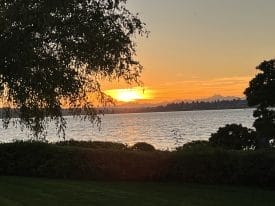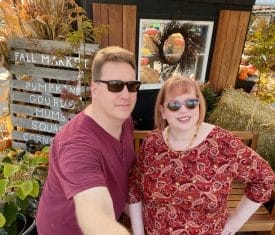October or August? More Pumpkin Farms, A Review of Lessons in Chemistry on Apple TV+, Talking a Little about Prizes (and Why You Shouldn’t Feel Bad if You Don’t Win)
- At October 09, 2023
- By Jeannine Gailey
- In Blog
 4
4
October or August? More Pumpkin Farms, Prizes, and Shows for Smart Girls
This week it has felt more like August than October, with sunny skies and temps up to 80°F! Glenn and I took advantage of the sun to make the rounds of our favorite pumpkin farms and gardens, Glenn got lots of outdoor projects done, and I walked so much every day my feet hurt (for an MS person, this is a good thing! It means you’re walking more and your legs aren’t giving out before your feet!)
It was also a week where many awards including the Nobel Prize and the MacArthur Genius Grant, were announced, so if you’re feeling like an also-ran, I’ve got a little bit to say about that later on in the post.
I also had a sneak peek at the new Apple TV show Lessons in Chemistry, based on the book about a frustrated female chemist who becomes a cooking show star. My review later in the post too.
For now, pictures of sunsets in Kirkland, Bob’s Corn & Pumpkin farm near Maltby (also a purveyor of excellent Pazazz apples, which are like even better Honeycrisps), and of course our local garden center and JB Growers Pumpkin Farm and Sunflower maze:
- Pumpkin Farms in Maltby
- Sunet in Kirkland
- Sunflower Maze in Woodinivlle
- Kirkland sunset with Glenn and me
A Brief Review from a Sneak Peek of the First Episode of Lessons in Chemistry on AppleTV+
I got a chance to see an early sneak peek of the first episode of the show based on book (which I really liked) Lessons in Chemistry. The intro’s music and art are pretty cool (doodling DNA with perky fifties tunes and colors), and Brie Larson does a fairly good job of the put-upon smart girl chemist who turns into a television cooking personality. This book covers a lot of the same ground that our recent Woodinville book club pick, When Women Were Dragons, sans dragons. It’s a very satisfying watch for any girl who’s been underappreciated and underestimated in the sciences (says the girl with the pre-med biology degree) and reminded me of several incidences that happened to me in the eighties and nineties. My question is, are there enough STEM girls to sustain an audience for the show? My husband, who has a degree in chemical engineering and is also a wonderful cook, was impressed, but thought the science parts weren’t hard-core enough. I will definitely tune in to watch it again on its real debut date. There have been several shows, including Dickenson (about the life of Emily Dickinson) that AppleTV+ gave a home to that maybe mainstream outlets wouldn’t have. This might be one of them. I wish the show luck.
And Speaking of Underappreciated…Talking about Awards and When You Don’t Win Them
This week might have felt discouraging to you (or encouraging, depending on your POV) with the announcements of the Nobel Prize and the MacArthur Genius Grants. Now, these are some of the biggest prizes, so you might not have been disappointed (see a hilarious discussion of a suicide attempt by Steve Corell in Little Miss Sunshine related to the MacArthur…I remember being the only one laughing in the theater during the joke, but I bet you guys would get it).
So…you’re a writer of a certain age, who has written a certain number of books, and after, say, twenty years, you’re still not getting major attention for your work. Read: you are not winning the big money, big attention awards.
But think about this: the people that are winning the big awards are not winning by accident, and maybe not even because of their talent. Someone out there has done a PR campaign, gotten to have lunch with the right people in charge, went to the right schools, got the right mentors. And a LOT of that has to do with class and with money. No disrespect to people that win big, but if you look behind the curtains, you’ll notice that a LOT of them have a LOT of money. It costs something to put yourself out there in the best light—either money from your publisher, or your family, or from powerful mentors at powerful institutions. Does this mean, shocking intake of breath, literature is not always a meritocracy? I’m just going to suggest that those of you struggling with not getting a major award should realize that there are aspects of the world of grants, fellowships, prestige awards that are not going to be…completely in your control. I wish people would talk about this stuff a little bit more and be more honest about what it takes to really make it as a poet. For instance, Louise Gluck inherited a fortune from her father’s invention of the X-acto knife. Merwin inherited a ton of money, TS Eliot married it (and then put his wife in an institution so he could access that money faster). No shade on any of those poets (well, maybe a little at Eliot—what a jerk!), but they were able to be influential poets because they had talent but also because they had money.
Not to say every poet with money becomes influential, or every prize winner has secret millions (but you’d be surprised how many do!) I wasn’t born with money, I didn’t marry into money, and I didn’t win the lottery, so I didn’t go to the fanciest schools and I’m still paying off student loans from my less-fancy schools. Does that mean I will live a writer’s life without recognition, awards, fellowships, etc? Not necessarily. I do know people who are just like me who have succeeded in making the “big time.” And Sylvia Plath won the Pulitzer…but not ’til many years after her death. So perhaps we all—writers, scientists, people in competitive fields like composing or physics—feel that we are being looked over, but continue with our work nonetheless. I remember my father, a robotics scientist, was always depressed a week or so after learning he didn’t win an NSF (the science equivalent of the NEA) grant. I later had a college roommate who was one of the people who screened NSF applications, who told me it was a depressing job because there were so many great applicants, but she could only choose a very small number to win. I think about both those things a lot.
So instead, let’s write not to win awards but because you like creating, and make sure not to let a rejection or someone else getting a prize you wanted ruin even a week of your life. After all, outside are pumpkin farms and sunsets and turning leaves. There are wars going on, yes, but there are also kind people doing kind things for other people. When we have wildfire smoke here, sometimes all you can do is notice the wildfires. When you feel a depression because you’ve worked many years and have little to show for it, it can feel like that wildfire smoke—it’s all you see and feel. Humans are built to notice danger, so we also have a negativity bias towards remembering our rejections, our failures, the things we haven’t gotten, the fires and wars going on around us, rather than our successes, our loved ones, evidence of kindness and the beautiful things in the world.
I didn’t mean to go a little dark here at the end. I may have been feeling a little down lately about my own writing and the writing life in general, questioning my purpose and my future. The new war that just sparked overnight, an earthquake close to here, all things that unsettle and upend. Though I love fall, the season does tend to make me more of a ruminant—what am I doing with my life? Where am I heading? I did want to reassure other writers that the reasons that they might be overlooked are more complex than they imagine, and money is such a taboo topic among writers, when it really shouldn’t be. I hope you feel a little better and wishing you a happy October week ahead. If you’re lucky enough to have some sunshine, I wish you pumpkin farms and a bunch of really good apples.










 Jeannine Hall Gailey served as the second Poet Laureate of Redmond, Washington and the author of Becoming the Villainess, She Returns to the Floating World, Unexplained Fevers, The Robot Scientist’s Daughter, and winner of the Moon City Press Book Prize and SFPA’s Elgin Award, Field Guide to the End of the World. Her latest, Flare, Corona from BOA Editions, was a finalist for the Washington State Book Award. She’s also the author of PR for Poets, a Guidebook to Publicity and Marketing. Her work has been featured on NPR’s The Writer’s Almanac, Verse Daily and The Year’s Best Fantasy and Horror. Her poems have appeared in The American Poetry Review, Poetry, and JAMA.
Jeannine Hall Gailey served as the second Poet Laureate of Redmond, Washington and the author of Becoming the Villainess, She Returns to the Floating World, Unexplained Fevers, The Robot Scientist’s Daughter, and winner of the Moon City Press Book Prize and SFPA’s Elgin Award, Field Guide to the End of the World. Her latest, Flare, Corona from BOA Editions, was a finalist for the Washington State Book Award. She’s also the author of PR for Poets, a Guidebook to Publicity and Marketing. Her work has been featured on NPR’s The Writer’s Almanac, Verse Daily and The Year’s Best Fantasy and Horror. Her poems have appeared in The American Poetry Review, Poetry, and JAMA.







Poetry Blog Digest 2023, Week 40 – Via Negativa
[…] Jeannine Hall Gailey, October or August? More Pumpkin Farms, A Review of Lessons in Chemistry on Apple TV, Talking a Littl… […]
Lesley Wheeler
That’s a revealing thing about studying modernist poetry: the experimental and fashionable writers had wealth; the writers who didn’t wrote accessibly to reach larger audiences (Frost, Hughes, Millay). I wish I had a crystal ball to see what will last, in the end.
Jeannine Gailey
Yes, that’s true! I wish some writers had gotten more attention in their lifetimes – would it have helped them, I wonder? And I wish there was more transparency in the literary world, but I guess that’s a small problem in a world of much bigger problems.
Marilyn McCabe
Yes, to all this.